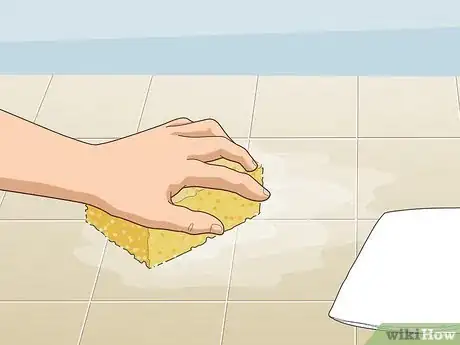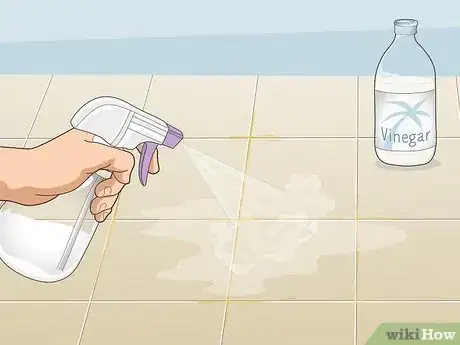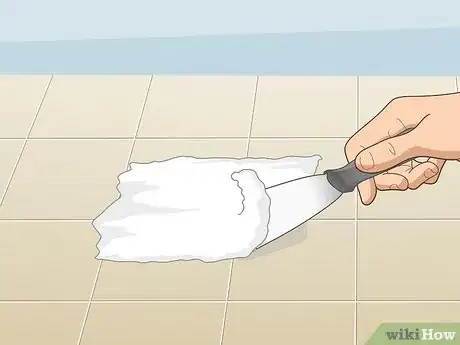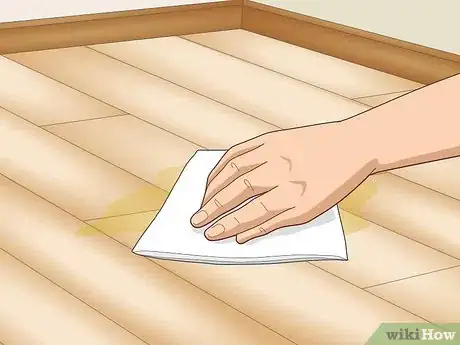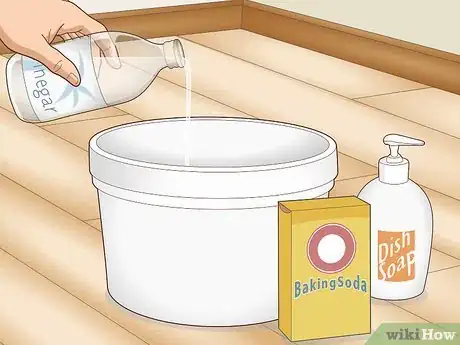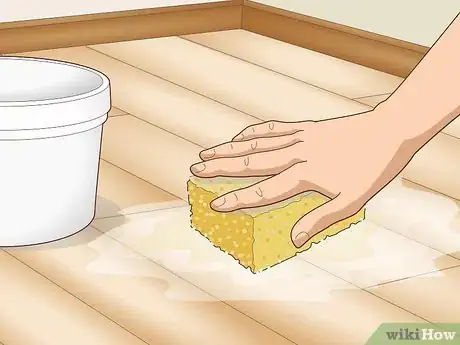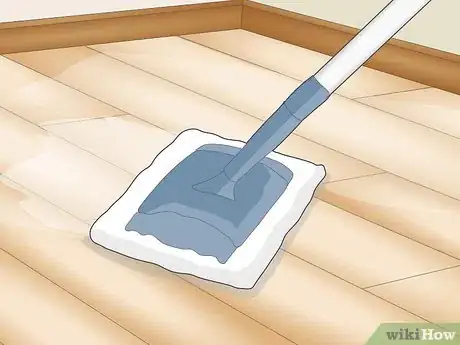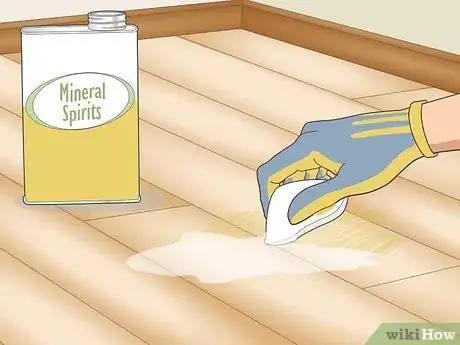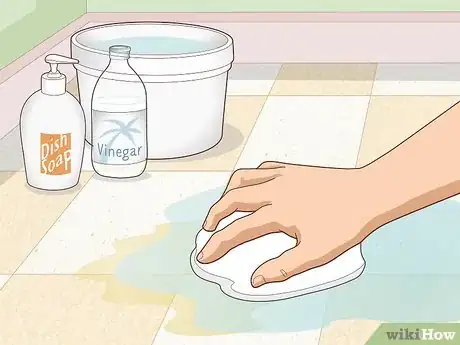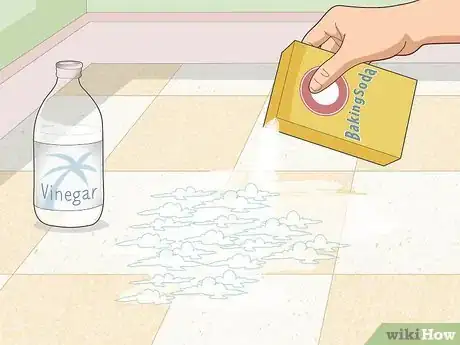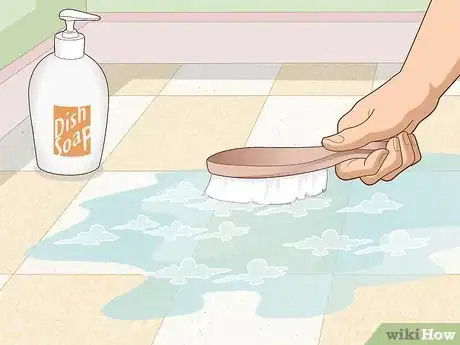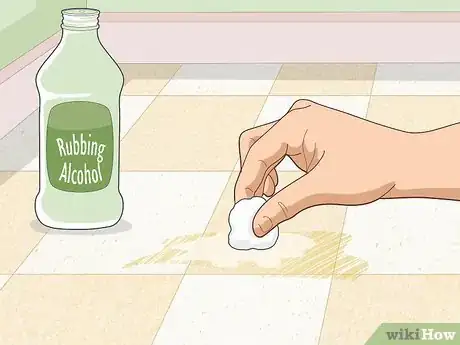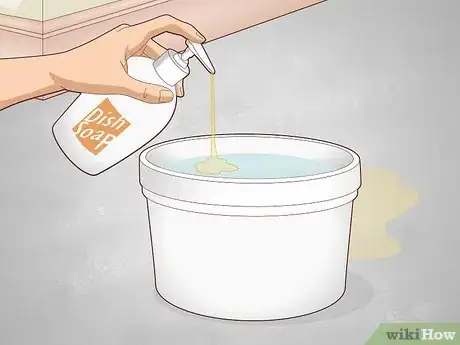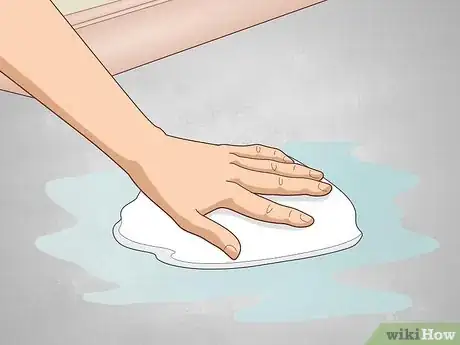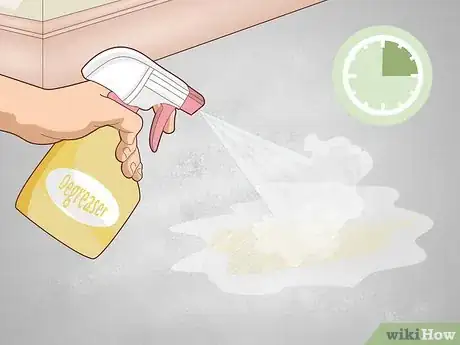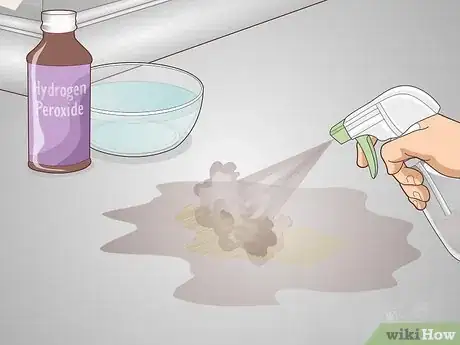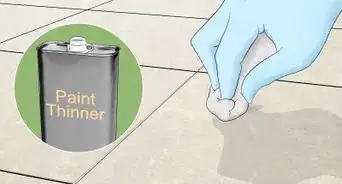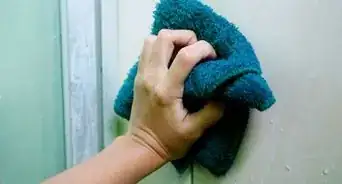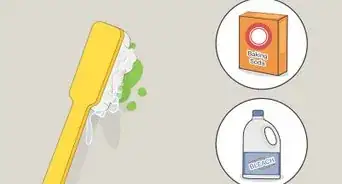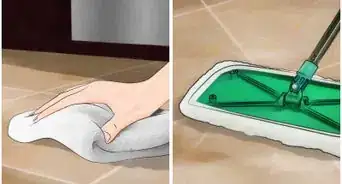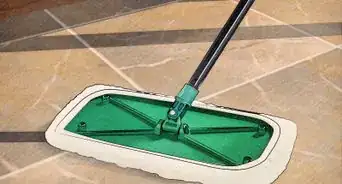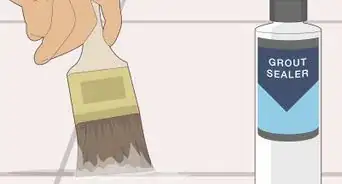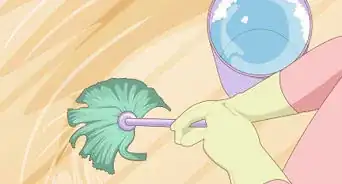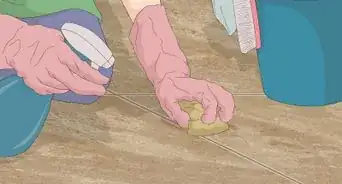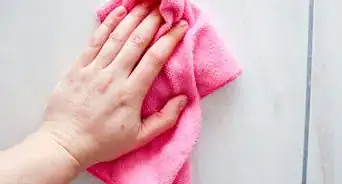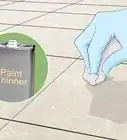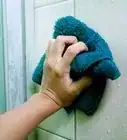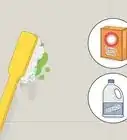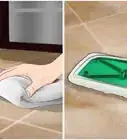This article was co-authored by Guy Peters. Guy Peters is the Owner of MOP STARS Cleaning Service, a complete house cleaning service for residential and commercial clients, based in Denver, Colorado. Founded in 2014, MOP STARS provides regular, move in/out, deep, and commercial cleaning services. Guy has a BA in Finance from the California State University - Sacramento and an MBA from Cornell University.
There are 18 references cited in this article, which can be found at the bottom of the page.
This article has been viewed 29,813 times.
Grease and oil can make quite a slippery mess. Cleaning the oil up is pretty straightforward, but you need to know what products you can and can’t use on your particular floors to keep them in good shape. You may already have the products you need in your kitchen or utility closet. With the right tools and a little elbow grease, your floors will be sparkling clean in no time!
Steps
Cleaning Grease off of Stone Tile
-
1Blot the greasy spot with a paper towel to soak up as much as possible.[1] As soon as you notice the oil or grease spill, put a paper towel on top of it and press down to lift up as much of it as you can. Don't rub it because that will only spread the oil over a larger area.[2] [3]
- It's important to get to it right away because oil can darken stone if it sinks in and dries (especially if it's unpolished slate). It probably won’t leave a stain after a few hours but try to get to it as soon as you notice.
-
2Rinse the area with water and dry it with a cloth. Soak a sponge under the faucet and wring it out so it's slightly damp. Gently scrub the area and then use a different cloth to pat it dry.[4]
- Stone is porous, so it’s important to wring out the sponge so you’re not exposing it to lots of water.
Advertisement -
3Use equal parts of vinegar and water to clean grease and grime from grout lines. Pour an equal amount of water and white vinegar in a spray bottle and shake it up. Spray it into the lines between the stone tiles and scrub it with a nylon brush to leave your grout lines sparkling clean.[5]
- Undiluted vinegar is extremely acidic and can damage grout lines and stone surfaces, so be sure to dilute it to about 50% (or more if you’re worried about it).
- If you don’t have a nylon brush, you can also use a medium-bristled toothbrush.
-
4Make a stain-lifting putty if you couldn’t clean up the oil right away. Oil stains stone once it’s dry, so you’ll need to make a paste to lift the stain. Pour 1⁄4 cup (59 mL) of acetone and 1/4 cup (45 g) of baking soda into a small plastic cup or container. Stir it together and keep adding the ingredients little by little until it's the consistency of pancake batter. Smear it onto the stain and cover it with plastic wrap. After 24 hours, scrape it off using a plastic putty knife, spatula, or some other utensil (anything but metal!).[6]
- This is a great option for polished stone like granite, quartzite, and marble.
- You can buy 100% acetone from your local hardware or home goods store.
- You can also use nail polish remover if you have some.
Removing Grease from Hardwood
-
1Blot away as much of the oil as you can with a paper towel right away. As soon as you notice the greasy spot on the floor, lay a paper towel on top of it to soak up as much as possible. Don't try to rub it around because that will only spread the oil over a larger area beyond the initial spill.[7]
- Grease that sits too long can stain your hardwood floor. It’s much easier to clean up a spill than it is to lift a stain.
-
2Blend together vinegar, liquid dish soap, baking soda, and warm water. Pour 1⁄8 cup (30 mL) of white vinegar, 1/8 cup (23 g) of baking soda, and 16 cups (3.8 L) of warm water in a bucket. Mix it around with your hand or a mop and get ready to clean![8]
- If you're only spot-cleaning a greasy area, cut the recipe in half or a quarter. You can also put a lid on the bucket and save the solution for future cleanings.
- If you have waxed floors, only use a small capful of vinegar (1 to 2 oz or 30 to 60 mL) or omit it altogether because it can damage the wax.
-
3Dip a sponge or mop in the solution and wipe the greasy area with it. Dunk a mop or a soft kitchen sponge into the bucket of homemade cleaning solution. Squeeze out the excess and start mopping or wiping the oil away. Move the mop or sponge in small, circular motions so you’re not missing any greasy spots.[9]
- Don't use the rough side of the sponge because it can damage the wood.
- It's best to use a soft microfiber mop because it won't soak up a ton of water (water and wood aren't friends, especially if you have natural wood or laminate).
- It's important to squeeze out excess water because pouring lots of water on wood can make it expand and crown (or lift up at the edges).
-
4Rinse the mop, squeeze it out, and wipe down the area again. Hold your mop or sponge over the sink and rinse it clean with plain water. Wring it out so it's just barely damp and then go over the areas a second time to wipe up the solution.[10]
- Don’t let the solution dry on the floor because it can leave it looking streaky and dull.
-
5Lift stubborn grease stains with mineral spirits if you didn’t clean the spill right away. Put on gloves and protective eyewear before opening the bottle of mineral spirits. Soak a cotton ball or the corner of a rag with mineral spirits and rub it onto the stain. This will work on most types of hardwood floors, even engineered hardwood and laminate. However, it can be a little strong and remove the finish on some floors so do a test run in an inconspicuous area first (like a closet or under a piece of furniture).[11]
- If you see any sign of the finish coming off on the cotton ball or rag as you're wiping it on, stop and go over the area with a damp rag.
- Don’t use acetone (or nail polish remover) as a substitute because it will eat through the finish on your wood floors.
- Vapors from mineral spirits can make you dizzy or irritate your throat, so it’s best to only use it in a well-ventilated area. If you’re cleaning a spill that occurred in a room that’s not well-ventilated, set up a fan before you open the bottle and get to work.
Eliminating Grease from Linoleum and Vinyl
-
1Clean freshly spilled grease off of linoleum floors with vinegar, dish soap, and water.[12] Pour 32 cups (7.6 L) of water, 1 cup (240 mL) of white vinegar, and a couple squirts of mild dish soap into a bucket. Dunk a microfiber mop into the natural solution and stir it around. Wring out the mop before you start cleaning the floor.[13]
- Always wring out your mop! Plopping a sopping-wet mop onto a linoleum floor can stain it or cause it to lift up (which is a way bigger problem than a simple oil spill).
-
2Remove dry, stubborn oil stains from linoleum with vinegar and baking soda. If you couldn’t clean up the oil right away and it left a stain, pour vinegar directly onto the area and sprinkle on a layer of baking soda until it fizzles. Let it sit for 15 minutes and then scrub the stain with a moist sponge or soft scrub brush. Wipe away the residue with a damp rag once you’re done.[14]
- If the grease stain is still there, try again but add a little more baking soda so it really fizzles up.
-
3Get freshly-spilled grease off of vinyl flooring with dish soap and water. Wet the area with a little water and scrub it with a soft brush or kitchen sponge to loosen it up. Put a few dabs of mild dish soap onto the area and rub it with a damp cloth or sponge.[15]
- Don't use a heavy-duty scrub brush or steel wool because they’re too abrasive and might scratch the vinyl.
- Vinyl floors can stand up to water better than other types of flooring, but it’s still a good idea to dry the floor after you’ve cleaned it.
-
4Dab rubbing alcohol onto the dry grease stain to lift it from vinyl flooring. If you couldn’t clean the grease up right away and it left a stain, pick up a bottle of rubbing alcohol if you don’t already have some. Douse a cotton ball or the corner of a rag with rubbing alcohol and dab it onto the greasy area. Then, use a soft-bristled brush to scrub the stain out.[16]
- If the stain is ultra-stubborn, you may want to clean it with a stripper or cleaning formula specially designed for vinyl floors. You can find these things at most home goods or hardware stores.
Lifting Grease off of Concrete Floors
-
1
-
2Wet the area with the solution and scrub it with a nylon brush. Dunk a rag into the solution and squeeze the soapy solution onto the area. Rub it in with a nylon brush, focusing on the main area where the grease or oil spilled.[19]
- You can also use a dish brush or medium-bristled toothbrush.
-
3Go over the area again with plain warm water. Rinse the rag with clean water and wring it out to remove the excess moisture. Wipe up the soapy water then rinse it and wring it out again. Keep doing this until most of the soapy water is gone.[20]
-
4Let degreaser sit on the stain for 15 minutes, then wipe it up. Leave the area slightly damp and spray it a few times with a degreaser. Let it sit for 15 minutes before wiping it up with a damp towel.[21]
- If the area starts to look like it's drying before 15 minutes is up, spray it with more degreaser.
-
5Remove dry oil stains from unfinished concrete with hydrogen peroxide. If you didn’t notice the oil after a day or 2, it could leave a stain on unfinished concrete. If this is the case, pour 1 part hydrogen peroxide and 3 parts water into a spray bottle and shake it up. Spray it on the stain and let it sit for 20 minutes. Then, after the 20 minutes, scrub it with a brush to help lift the stain.[22]
- You can also use stronger chemicals like bleach or ammonia—unfinished (i.e. not shiny) concrete can stand up to most strong cleaning solutions.
- Don’t leave the hydrogen peroxide on for longer than 20 minutes because it could bleach the concrete.
Expert Q&A
-
QuestionHow do you get grease off tile floor?
 Guy PetersGuy Peters is the Owner of MOP STARS Cleaning Service, a complete house cleaning service for residential and commercial clients, based in Denver, Colorado. Founded in 2014, MOP STARS provides regular, move in/out, deep, and commercial cleaning services. Guy has a BA in Finance from the California State University - Sacramento and an MBA from Cornell University.
Guy PetersGuy Peters is the Owner of MOP STARS Cleaning Service, a complete house cleaning service for residential and commercial clients, based in Denver, Colorado. Founded in 2014, MOP STARS provides regular, move in/out, deep, and commercial cleaning services. Guy has a BA in Finance from the California State University - Sacramento and an MBA from Cornell University.
House Cleaning Professional Soak up as much as grease as you can with absorbent paper towels. Try to blot instead of wipe so you don't spread the grease around.
Soak up as much as grease as you can with absorbent paper towels. Try to blot instead of wipe so you don't spread the grease around. -
QuestionDoes vinegar remove grease from floor?
 Guy PetersGuy Peters is the Owner of MOP STARS Cleaning Service, a complete house cleaning service for residential and commercial clients, based in Denver, Colorado. Founded in 2014, MOP STARS provides regular, move in/out, deep, and commercial cleaning services. Guy has a BA in Finance from the California State University - Sacramento and an MBA from Cornell University.
Guy PetersGuy Peters is the Owner of MOP STARS Cleaning Service, a complete house cleaning service for residential and commercial clients, based in Denver, Colorado. Founded in 2014, MOP STARS provides regular, move in/out, deep, and commercial cleaning services. Guy has a BA in Finance from the California State University - Sacramento and an MBA from Cornell University.
House Cleaning Professional Vinegar can work in a pinch, but it won't work as well as traditional dish soap.
Vinegar can work in a pinch, but it won't work as well as traditional dish soap. -
QuestionDoes dish soap remove grease?
 Guy PetersGuy Peters is the Owner of MOP STARS Cleaning Service, a complete house cleaning service for residential and commercial clients, based in Denver, Colorado. Founded in 2014, MOP STARS provides regular, move in/out, deep, and commercial cleaning services. Guy has a BA in Finance from the California State University - Sacramento and an MBA from Cornell University.
Guy PetersGuy Peters is the Owner of MOP STARS Cleaning Service, a complete house cleaning service for residential and commercial clients, based in Denver, Colorado. Founded in 2014, MOP STARS provides regular, move in/out, deep, and commercial cleaning services. Guy has a BA in Finance from the California State University - Sacramento and an MBA from Cornell University.
House Cleaning Professional Absolutely! Dish soap is a degreaser and is safe to use linoleum, vinyl, ceramic, and similarly strong flooring.
Absolutely! Dish soap is a degreaser and is safe to use linoleum, vinyl, ceramic, and similarly strong flooring.
Warnings
- Avoid using anything with ammonia on wood laminate, stone, vinyl, or linoleum because it'll eat through the finish and damage the floor.[24]⧼thumbs_response⧽
Things You’ll Need
Cleaning Grease off of Stone Tile
- Paper towel
- Cat litter
- Vacuum or broom
- Water
- Cloth
- Sponge
- Acetone
- Baking soda
- Plastic cup or container
- Plastic wrap
- Plastic putty knife or spatula
- White vinegar
- Spray bottle
- Nylon scrub brush or toothbrush
Removing Grease from Hardwood
- Paper towel
- White vinegar
- Liquid dish soap (mild)
- Baking soda
- Water
- Soft kitchen sponge or microfiber mop
- Mineral spirits
- Cotton ball
- Rag
Eliminating Grease from Linoleum and Vinyl
- White vinegar
- Dish soap (mild)
- Water
- Bucket
- Microfiber mop
- Rubbing alcohol
- Cotton ball or rag
- Soft-bristled brush
- Baking soda
- Cloth
- Vinyl floor cleaning formula or stripper (optional)
Lifting Grease off of Concrete Floors
- Water
- Dish soap (mild)
- Bucket
- Nylon scrub brush
- Rag
- Degreaser
- Hydrogen peroxide
- Spray bottle
References
- ↑ Guy Peters. House Cleaning Professional. Expert Interview. 27 September 2021.
- ↑ https://www.naturalstoneinstitute.org/consumers/stains/
- ↑ Guy Peters. House Cleaning Professional. Expert Interview. 27 September 2021.
- ↑ https://www.naturalstoneinstitute.org/default/assets/File/stone-professionals/commercial_care_clean.pdf
- ↑ http://www.marble-institute.com/consumers/stains/
- ↑ https://www.naturalstoneinstitute.org/default/assets/File/stone-professionals/commercial_care_clean.pdf
- ↑ https://www.thisoldhouse.com/flooring/21015626/how-to-clean-wood-floors
- ↑ https://youtu.be/L-hVVHD5kSY?t=16
- ↑ https://www.today.com/health/how-clean-hardwood-floors-101-2d12054704
- ↑ https://www.thisoldhouse.com/flooring/21203387/how-to-clean-laminate-floors
- ↑ http://www.flooring.org/blog/do-mineral-spirits-remove-finish-from-engineered-hardwood-flooring/
- ↑ Guy Peters. House Cleaning Professional. Expert Interview. 27 September 2021.
- ↑ https://cleanhomeguide.com/best-way-to-clean-linoleum-floors/
- ↑ https://www.angieslist.com/articles/home-cleaning-tips-vinegar-and-baking-soda.htm
- ↑ https://ohsospotless.com/how-to-clean-vinyl-floors/
- ↑ https://ohsospotless.com/how-to-clean-vinyl-floors/
- ↑ Guy Peters. House Cleaning Professional. Expert Interview. 27 September 2021.
- ↑ https://youtu.be/jTL2r6r9RKE?t=129
- ↑ https://youtu.be/swb14AJ4baU?t=29
- ↑ https://youtu.be/swb14AJ4baU?t=128
- ↑ https://youtu.be/Bru3G9rKXiw?t=121
- ↑ https://pubchem.ncbi.nlm.nih.gov/compound/Hydrogen-peroxide#section=Toxicity-Summary
- ↑ https://www.cleandaylondon.com/how-to-clean-laminate-floors/
- ↑ https://www.thisoldhouse.com/flooring/21203387/how-to-clean-laminate-floors


